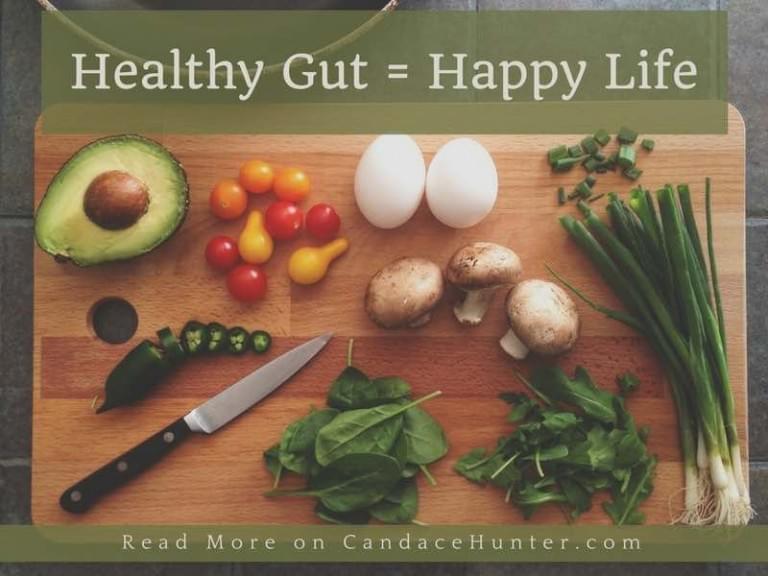Gut Health is a big topic among herbalists. We spend all kinds of time talking about digestion with our clients, students, and amongst ourselves. Why is the health of your intestinal tract so important?
Healthy Gut = Happy Life
It all boils down to happiness. When we’re healthy, we’re happy. Health is dependent on your ability to take in the stuff of life, to digest it, and to express the results in a satisfying way. Happiness requires you to tend to your digestion on all levels, guts included.
Our current culture places a lot of value on pleasures of very specific types: Sweet and Salty. In foods, sweet and salty are obvious. Think about the last meal you ate out. Chances are the menu was loaded with foods that are sweet, like sweet-based salads made with honey-style dressings and lettuces with very little bitter like iceberg and romaine, or salty like those tasty chowders that leave you feeling slightly parched later on. We have a whole industry of folks who study how to make foods more attractive to people and then engineer our eating experiences to match what we humans most desire; food engineers know sweet and salty are the first two tastes we develop and they are almost universally the ones we desire in good times and in bad. Most folks would describe their comfort foods as either sweet or salty or quite possibly both.
What’s so bad about Sweet and Salty?
Nothing, really. They’re important to our general health and wellbeing. The problem isn’t with them specifically. The problem is with the excesses to which we’ve relied on them to make up for what we’re lacking in the rest of our lives. We’re more susceptible to taking in too much sweet and salty through our foods (or drinks) when we’re stressed. That, in turn, throws off our nutritional profile, so we have fewer of some of the key building blocks to good health we need to deal with and recover from stress.
In the gut, that looks like inflammation conditions like leaky gut syndrome, or autoimmune diseases like Crohn’s disease, or diseases and conditions that result from general imbalance and depletion like diabetes.
At early progressions, it can look like simple digestive discomforts, including diarrhea, constipation, indigestion, bloating, and stomach or abdominal discomfort. It can also look like what Traditional Chinese Medicine calls phlegmy conditions, like weight gain and general puffiness or inflammation. For many of us, it’s the imbalance in our lifestyles that leads us to trigger these diseases in our lives.
Ultimately, health depends on what we eat and how we digest it as well as how well we digest the experiences of our lives…aka how we manage our stress.
How Do We Change?
You don’t have to overhaul your life all at once, eliminate everything that stresses you, and eat a diet stripped of sweet and salty delights. Those kinds of giant swings often lead to counter-swings where you find yourself sometime later making choices that are even worse for you than before you tried to change. Change can begin on one level with one baby step or, as Staci Joy says, one little thing.
The first little thing I recommend changing is to add something to your life. So many of the lifestyle changes promoted by folks in the Health and Wellness industry today include eliminating or paring back and stripping down, like the Paleo Diet or the Ketogenic Diet, which ask you to give up some or all grains amongst other foods. Those extreme steps work for some folk, but most of us need to take change a lot slower, starting off with something that’s easy and feels good rather than restrictive. We have enough restrictions in our lives without creating a bunch more before we’re ready.
Adding something small to your daily life can feel really good, especially if you focus on it as a gesture of extreme self-care…even when the “extreme” nature of your gesture is as small as taking a new herbal tea once a day to give your body extra phytonutrients or adding a daily dose of a complimentary flavor to your diet. In truth, the gesture doesn’t have to feel extreme for you to conceptualize it as such. Telling yourself you deserve a bit of extreme self-care is deeply nurturing on a spiritual-emotional-psychological level.
Begin Here!
Choose to add something small to your lifestyle to get started. Extra phytonutrients are an excellent option. You can get them through herbal teas or you can find other ways to incorporate them into your life. One of my favorite homemade extracts for nutrition and subtly altering diet is Fire Cider.
Fire Cider was originally developed as a means of promoting health and fighting off common flus and colds. It’s been around in one form or another for at least 400 years. Our modern versions are thought to be variations on the old Four Thieves vinegar formulation developed in plague-ridden Europe in the 1600s.
Rosemary Gladstar made the term Fire Cider particularly famous with her well-known and much-loved recipe first published back in the 1980s. Most herbalists have a variation of their own, as do I. Mine is focused on infusing as many nutrients into good, raw apple cider vinegar as possible to help the body absorb nutrition and create the foundation for health we need to manage stress as well as fight off illness.
I like Fire Cider as a vehicle for change in part because it helps bring balance to the digestive system. The flavors in Fire Cider are predominantly pungent and sour, two of the flavors most often missing in our modern diets. By adding a little sour to your diet, you help retrain your digestive system to be ready and able to digest your foods (and your psyche to digest your experiences). The pungent taste, which contributes the fire in this extraction, helps to get things moving. These two flavors offer some balance to sweet and salty, which can help shift the gut toward health.
Health begins in the gut, according to Thomas Easley, Clinical Herbalist and Author of The Modern Herbal Dispensatory: A Medicine-Making Guide. Happiness is rooted in good health, so why not take your first step toward health and well being with an easy diet change today?
Fire Cider for Health and Wellbeing
Ingredients
- 5 ounces/143 g (5 parts) Horseradish root, fresh
- 5 ounces/143 g (5 parts) Ginger root, fresh
- 2 ounces/57g (2 parts) Oatstraw, dry
- 2 ounces/57g (2 parts) Garlic cloves, fresh
- 1 ounce/30g (1 part) Turmeric root, fresh (or 1/2 oz/15 g dried)
- 1 ounce/30g (1 part) Yarrow flower, dried
- 1/2 ounce/15g (1/2 part) Cayenne pepper, dried (whole or powdered)
- 64 ounces/1.8 l Raw, Organic Apple Cider Vinegar (mother-in)
Equipment
- Bowls
- Grater
- Funnel
- 2 glass quart jars with lids (or 1 half gallon glass jar with lid)
- Strainer
How-to Make Fire Cider
- Shred or grate all the fresh ingredients into one bowl. Mix them well.
- Measure the dried ingredients into a second bowl. Mix them well.
- Measure half of each bowl full of ingredients into a quart-sized canning jar or all of them into a half-gallon sized canning jar.
- Add the apple cider vinegar to fill each canning jar, stirring as needed to eliminate all air bubbles from the mixture.
- Cap the jars securely and let them stand where you’ll remember to shake them daily for 2-4 weeks.
- When you’re ready in 2-4 week’s time, strain the solids from the vinegar, saving the vinegar for use. Compost the solids. Store the finished vinegar in a sealed glass container in a cool place, like the refrigerator.
Some folks like to take Fire Cider straight up by the spoonful. If that’s a little intense for you, try using Fire Cider as a daily tonic by adding 2 or more tablespoons to water (ice water is refreshing and mineral water creates a shrub-like experience).
You can also use it to flavor meals, such as doused on your greens or added to your favorite salad dressing. Fire Cider is best used uncooked, but I’ve also added it to soups and stews when they need a little brightness or bite.
Fire Cider makes a most delicious marinade, too. Brush it on your meats before barbecuing or let them soak for an hour or up to overnight to impart a lovely flavor and help tenderize them before cooking. You can marinade extra firm tofu or tempe in Fire Cider before grilling for 30 minutes for a spicy bite, too.
Resources
- one little thing: health transformation for the tortoise and the hare (Volume 2)
- The Modern Herbal Dispensatory: A Medicine-Making Guide
- Rosemary Gladstar’s Fire Cider-Making Video
- Rosemary Gladstar for Free Fire Cider
- Fire Cider!: 101 Zesty Recipes for Health-Boosting Remedies Made with Apple Cider Vinegar






